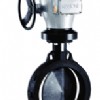NEW COMPOSITE VALVE RANGE LAUNCHED BY TYCO FLOW CONTROL

In one of the most significant developments in the industrial valve market for decades, Tyco Flow Co
The valves offer a wide range of benefits including high chemical resistance against process medium, excellent external corrosion resistance and reduced weight - while being competitively priced compared to traditionally constructed products. Tyco predicts that the products will initially appeal to the food, brewing and industrial water applications including sea water at high temperatures, deionisation, brine, and cargo container applications.
The CompoSeal range has a split body that clamps the seat securely in position around the entire 360 degrees - making it suitable for high line velocities and vacuum applications - and a one piece disc-stem. The one-piece disc-stem minimises hysteresis problems, makes CompoSeal suitable for regulating as well as on/off duty, and ensures the shaft remains dry to eliminate crevice corrosion between the shaft and disc. Furthermore it gives the range a high Kv value.
Keystone CompoSeal’s double D shaft design gives a clear visual indication of disc position even when the valve is installed in the pipe line and four multi-drilled locating holes compatible with PN 6/10/16 and ANSI 150 and guarantee perfect concentric positioning between pipe flanges. Finally incorporated flange O rings remove the need for gaskets and speed up installation.
CompoSeal is available with short lead times thanks to the streamlined production techniques that Tyco Flow Control has adopted and can operate in a temperature range of -40 to 120 degrees Celsius with a maximum pressure rating of 10 bar.
“Composite materials have made huge progress in recent years and are now common in automotive, aerospace and other cutting edge technologies,” commented a Tyco spokesman. “Thanks to their improved mechanical properties as well as their chemical and physical behaviour, CompoSeal valves will deliver comparable performance to traditional metal resilient seated butterfly valves. Add to that the increased costs of materials such as iron, stainless steels and metal alloys and the advantage of composite valves are very significant.
“Final performance of valves can be determined to a great degree by design simplicity and one of the advantages of composites is that they enable multiple components and functions to be integrated into single parts,” he concluded.
For more information on Tyco Flow Control, please visit www.tycoflowcontrol.com

| Telephone: | 0870 240 1978 |
| Email: | uksales@emerson.com |
| Website: | https://www.emerson.com/en-gb/automation/home |
| More information on the Emerson Process Management Ltd BVAA Member Directory Page |
Search related valve / actuator articles: Emerson Process Management LtdIssue 10Butterfly Valves







-web.jpg)





